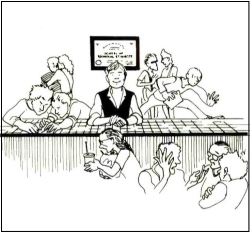
Say Too Much, Say Too Little
Sometimes there’s absolutely no doubt about who the Boss is. We’ve all had to deal with the Overbearing Producer for whom nothing seems to be good enough, and no matter what you do, you’ll be told that it’s the wrong approach. (Usually because the Boss didn’t think of it first.) You try to be helpful and always seem to end up getting shafted for it.
Intellectually, you know that he/she is the boss, and that they too have “got to serve somebody,” but on the gut level you’re still feeling: “Hey, who is this clown who doesn’t know the room; doesn’t know the equipment; doesn’t know his/her track assignment from a whole note; has no apparent auditory abilities; and is telling me in front of everyone how to do my job?!”
And so your creative side pulls a sour-grapes act. You go on auto-pilot (minimum commitment status) and you get quiet and sullen and, somehow, you can’t see your way clear to making helpful suggestions anymore. This is dangerous, since everyone will consider your silence as either “spoiled-brat-syndrome” (if they know how the Boss has been treating you), or lack of knowledge/ competence (if they don’t).
A sympathetic and supportive second engineer can be a great help here. If you don’t have one (and even if you do) try to do an unusually good job – just for spite. Keep smiling!
Some of us (like me) suffer the need to express our opinions too frequently. It’s a good idea to keep a constant watch on your own emotional VU meters, and know your own motives for making any particular statement. “Am I really helping to get the Best Possible Track, or am I just honkin’ my own horn ?” Us bigmouths need to be ruthless in our self-monitoring. In other words, be sure your own head is in alignment before punching into any debate.
Maintaining a laid -back attitude has a hidden advantage. When you finally do say something (assuming it’s not asinine) it’ll carry more weight. There’s a tour sound engineer for a major progressive rock band who has never been heard to say anything above a whisper. His quiet manner predisposes his associates to really “listen” to what he has to say; and what he says is always highly accurate. He deserves the “Tact Factor Award” and, much more importantly the respect of his fellow professionals.
Above all, if you possibly can, it’s a good idea to be somewhere else when the money changes hands. When it comes time for the musicians to be paid, try and find something to be busy with. (My favorite dodge is to either join the break-down gang in dealing with mikes and cables, or to be fussing with levels on rough mix copies). This accomplishes two things. Not only does it leave the parties involved freedom to dicker, it also disinvolves you and the studio from any potential bad-blood resulting from the all-too-frequent last minute wheeling and dealing. ( “But on the phone you said: ‘Triple scale, and a coupon!’”)
If the client is paying the studio at the time of the session, try to have as little involvement in this interaction as you can. Don’t even be in the room unless one or both parties want you there. If you’re on the studio payroll, all that should ever be required of you is an accurate account of time and materials used, and/or a straightforward technical description of downtime.
If you’re an independent you must make it clear to whatever producer and /or artist you are working for that you will not lie for them. Try to establish this as early on as possible in the relationship. Fortunately for you, technical debates are generally easy to resolve. Either the studio works, or it doesn’t; you’ll know it (or you should) and test gear will show it. For whatever it’s worth, I don’t approve of engineers taking money from the studio “under the table.”
A legitimate commission or finders’ fee is one thing; a silent kickback that the artist and/or producer isn’t supposed to know about can only become an obstacle to the Best Possible Track. It puts a psycho-defensive wall between engineer and artist, precluding sincerity and eye contact, and many of the other subtle tools of the Tact Factor. If we engineers do nothing else, at least we shouldn’t get in the way of the music; our equipment usually does enough getting in the way as it is.
Say What?
Knowing what to say is only slightly less important than knowing what not to say. A particularly tough time is drawn by the Maintenance Person called into the studio for a quick fix. While most of the left hemisphere of the brain is busy with a point-to-point analysis of what might be troubling the ailing gear, most of the right hemisphere must feel out the “vibes” in the room, and try to cool out everyones’ anger /disappointment.
And the Maintenance Person has to do all of this, usually without much background as to who is who and what they might be feeling. Truly it’s the case of a doctor needing to develop an instantaneous, situation-specific bedside manner. The “patient” is a mechanical or electronic device, but the “relatives” are human.

